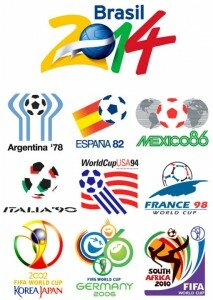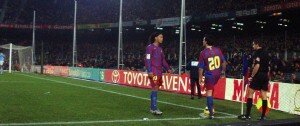At long last we have our field of 32 set!
The 2014 FIFA World Cup draw has finally been announced and we know the fate of our favorite (and least favorite) nations. The tournament won’t start until June, but that doesn’t mean we can’t take an early look at all eight groups and some of the story lines presented by each one. Let’s get started!
Group A: Brazil, Croatia, Mexico, Cameroon
Biggest Question: Who will finish 2nd?
Must See Match: Brazil-Mexico
Best Player: Neymar (Brazil)
Most Likely To Land A Big Summer Transfer: Dejan Lovren (Croatia)
Predicted Finish: 1) Brazil 2) Mexico 3) Croatia 4) Cameroon
It’s a fairly easy draw for the hosts, but there’s legitimate confusion over who could take second. Croatia probably has the most individual talent, but they didn’t look convincing in qualifying and outside of their 1998 semifinal run they haven’t had much success since gaining their independence. Mexico also looked weak in qualifying, but they’ve got Brazil’s number at the moment having defeated them twice in 2012; once in a friendly and once at the gold medal match of the 2012 Summer Olympic Games. Cameroon have qualified more than any other African nation, but they fail impress when they get to the final and star striker Samuel Eto’o is a shell of his former self.
Look for Mexico to finish second and keep an eye on Croatia center back Dejan Lovren who has impressed with England’s Southampton so far this season.
Group B: Spain, Netherlands, Chile, Australia
Biggest Question: Who fails to advance?
Must See Match: Spain-Chile
Best Player: Alexis Sanchez (Chile)
Most Likely To Land A Big Summer Transfer: Matthew Leckie (Australia)
Predicted Finish: 1) Spain 2) Netherlands 3) Chile 4) Australia
This is about as close as it gets to a true “Group Of Death”. We open with a re-match of the 2010 final while Chile, led by Barcelona star Alexis Sanchez, will challenge for second place and the Aussies will be a difficult matchup for the favorites. The Dutch breezed through qualifying and are still a bit of an unknown quantity because of it. Spain and Chile finished 2-2 in a recent friendly and should provide another thrilling match when they meet again in June.
Spain are advancing out of this group, it’s simply a question of who will join them. I like the Netherlands to beat Chile in what will prove to be the decisive match in this group and advance with the defending champions. This would give us Spain-Mexico and Brazil-Netherlands in the Round of 16 and that’s an incredibly enticing prospect!
Group C: Colombia, Greece, Ivory Coast, Japan
Biggest Question: Who is the favorite?
Must See Match: Colombia-Greece
Best Player: Falcao (Colombia)
Most Likely To Land A Big Summer Transfer: Konstantinos Mitroglou (Greece)
Predicted Finish: 1) Colombia 2) Greece 3) Japan 4) Ivory Coast
This group is completely up for grabs. All four are capable of advancing and they all have very different playing styles. Colombia are led by strikers Radamel Falcao and Jackson Martinez. Greece have a rock solid defense and one of the hottest strikers in Konstantinos Mitroglou. Ivory Coast are led by veterans like the Toure Brothers (Kolo and Yaya) and Didier Drogba. Japan have a very technical side that values possession and features creative playmakers Keisuke Honda and Shinji Kagawa.
Ultimately I think Colombia are the only team good enough to score on Greece (thanks mostly to Falcao’s ability) and the winner of that game could wind up deciding who wins and who comes in second. If you’re high on tactical variety this is your group.
Group D: Uruguay, Costa Rica, England, Italy
Biggest Question: Which Mario Balotelli Shows Up?
Must See Match: Uruguay-England
Best Player: Luis Suarez (Uruguay)
Most Likely To Land A Big Summer Transfer: Nicolas Lodeiro (Uruguay)
Predicted Finish: 1) Uruguay 2) England 3) Italy 4) Costa Rica
If you ask me, this is the best group from top to bottom. Costa Rica came in second in CONCACAF qualifying and feature a handful of players playing in Europe while the other three members of this group are very much known quantities. The key to this group is how Mario Balotelli plays. If he performs like he did at the Confederations Cup, Italy can win this group. If he loses his cool and can’t score, Italy will have a tough time advancing past England and Uruguay. All eyes in England will be fixed upon their match against Uruguay and their polarizing striker Luis Suarez. Keep an eye on Uruguay central midfielder Nicolas Lodeiro who, somehow, still hasn’t made a big money move to Europe and currently plays for Botafogo in Brazil.
The potential Round of 16 matchups would give us Luis Suarez against what is possibly the best defense in the tournament as well as England and Colombia doing battle.
Group E: France, Ecuador, Honduras, Switzerland
Biggest Question: How Good Is Switzerland?
Must See Match: France-Switzerland
Best Player: Franck Ribery (France)
Most Likely To Land A Big Summer Transfer: Granit Xhaka (Switzerland)
Predicted Finish: 1) Switzerland 2) France 3) Ecuador 4) Honduras
I’m sure I’m in the minority on this, but I think Switzerland are pretty darn good. They’ve got a great mix of veterans (Juventus’s Stephan Lichsteiner, Fulham’s Philippe Senderos) and youth (Borussia M’Gladbach’s Granit Xhaka, Bayern Munich’s Xherdan Shaqiri) and I think they’ll shock us all by winning this group; assuming they get the necessary result when they face France. France are easily the most talented team, but they’re national team fortunes have been on a steady downturn ever since the 2006 Final when they lost to Italy. I’m not sure they’ve put it together enough to win this group.
Group F: Argentina, Bosnia-Herzegovina, Iran, Nigeria
Biggest Question: Will Lionel Messi finally shine at the World Cup?
Must See Match: Iran-Nigeria
Best Player: Lionel Messi (Argentina)
Most Likely To Land A Big Summer Transfer: Uche Nwofor (Nigeria)
Predicted Finish: 1) Argentina 2) Bosnia-Herzegovina 3) Nigeria 4) Iran
Will all due respect to those involved, this is the the worst group in the tournament. Argentina and Bosnia-Herzegovina should advance comfortably. Nigeria and Iran help open this group and I’ve highlighted it only because Iran have qualified before back in 2002 and should manage to shock Nigeria and steal three points it could make this group a bit more interesting.
The real story line from this group isn’t about the group itself as much as the tournament. We’re all waiting for Lionel Messi to have his World Cup “moment” and this draw gives him a great opportunity to do so. If predictions hold, we get a tantalizing France-Argentina showdown in the Round of 16.
Group G: Germany, Portugal, Ghana, United States
Biggest Question: How Good Is Portugal?
Must See Match: Portugal-United States
Best Player: Cristiano Ronaldo (Portugal)
Most Likely To Land A Big Summer Transfer: Aron Johannsson (United States)
Predicted Finish: 1) Germany 2) United States 3) Portugal 4) Ghana
Another “Group Of Death” that is stacked from top to bottom. Germany should have no issues winning this group, but who comes in second is still up for grabs. The US got the best of Portugal in 2002 and will look to do so again this time around. They need to get a win in their first game against Ghana and that’s entirely possible given they’ll want revenge after the Black Stars knocked them out of the Round of 16 in South Africa. Much like Italy, Portugal are dependent upon their one proven star: Cristiano Ronaldo.
If anything happens to him between now and June (and for some reason I have a sneaky suspicion it will) they will be left with a lot more questions than answers.
Group H: Belgium, Algeria, Russia, South Korea
Biggest Question: How far can Belgium go?
Must See Match: Russia-South Korea
Best Player: Vincent Kompany (Belgium)
Most Likely To Land A Big Summer Transfer: Faouzi Ghoulam (Algeria)
Predicted Finish: 1) Belgium 2) Russia 3) South Korea 4) Algeria
Belgium should win this group, but everyone wants to know how far they can go in the knockout rounds. The battle for second between Russia and South Korea should be a lot of fun to watch and Algeria has done a good job producing players via France. If my predictions hold we’ll get some great Round of 16 matchups between USA/Belgium and Germany/Russia.




Connect with GFT